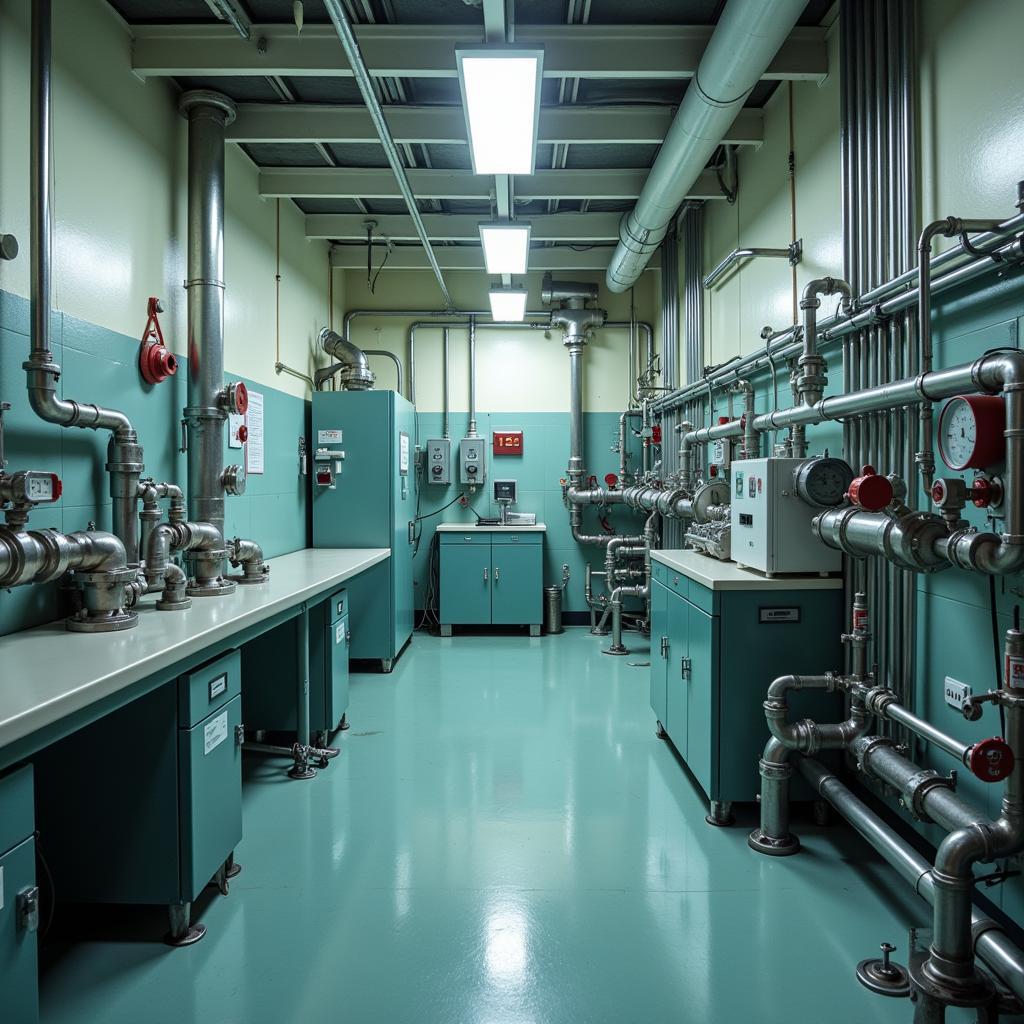Hospital Mechanical systems are a critical component of healthcare facilities, ensuring the safety, comfort, and well-being of patients, staff, and visitors. These intricate networks of equipment and technology work tirelessly behind the scenes to maintain optimal environmental conditions and support vital medical procedures. From HVAC and ventilation to plumbing and medical gas supply, every element plays a crucial role in the seamless operation of a modern hospital.
 Hospital Mechanical Room Equipment
Hospital Mechanical Room Equipment
The Importance of Reliable Hospital Mechanical Systems
The reliability of hospital mechanical systems cannot be overstated. Malfunctions or breakdowns can have serious consequences, impacting patient care, staff safety, and the overall functionality of the facility. For instance, a failure in the HVAC system could lead to temperature fluctuations, compromising the sterile environment required for surgeries and other medical procedures. Similarly, a disruption in the medical gas supply could have life-threatening implications for patients relying on oxygen or anesthesia.
Key Components of Hospital Mechanical Systems
Hospital mechanical systems encompass a wide range of equipment and systems, each with a specific function:
- HVAC Systems: Heating, ventilation, and air conditioning (HVAC) systems are responsible for maintaining optimal temperature and humidity levels throughout the hospital. They also play a crucial role in infection control by filtering and circulating air to prevent the spread of airborne pathogens.
- Plumbing Systems: Hospital plumbing systems are essential for delivering clean water for drinking, sanitation, and medical procedures. They also manage wastewater disposal and prevent cross-contamination.
- Medical Gas Systems: These systems provide a safe and reliable supply of medical gases, such as oxygen, nitrous oxide, and medical air, to various points throughout the hospital, including operating rooms, patient rooms, and critical care units.
- Fire Protection Systems: Hospital fire protection systems are designed to detect and suppress fires, ensuring the safety of occupants and protecting valuable medical equipment. These systems typically include sprinklers, fire alarms, and emergency lighting.
Maintaining Hospital Mechanical Systems
Maintaining the optimal performance of hospital mechanical systems requires proactive measures, including:
- Regular Inspections and Maintenance: Routine inspections by qualified technicians are essential to identify and address potential issues before they escalate into major problems.
- Preventive Maintenance: This includes tasks such as filter replacements, lubrication of moving parts, and calibration of sensors to prevent premature wear and tear.
- Timely Repairs: Promptly addressing any malfunctions or breakdowns is crucial to minimize downtime and ensure the continuous operation of critical systems.
- Compliance with Regulations and Standards: Hospital mechanical systems must adhere to strict regulations and industry standards to ensure safety and efficiency.
The Future of Hospital Mechanical Systems
The future of hospital mechanical systems is marked by innovation and technological advancements. Here are some key trends:
- Energy Efficiency: Hospitals are increasingly adopting energy-efficient technologies, such as high-efficiency boilers, chillers, and LED lighting, to reduce their environmental footprint and operating costs.
- Smart Building Technology: The integration of smart building technology allows for centralized monitoring and control of mechanical systems, optimizing performance, and reducing energy consumption.
- Data Analytics: Data analytics are being used to monitor system performance, predict potential failures, and optimize maintenance schedules.
“The use of data analytics in hospital mechanical systems is transforming how we maintain these critical assets,” says John Smith, a leading hospital facilities management expert. “By leveraging data, we can proactively address issues, improve efficiency, and reduce downtime.”
Conclusion
Hospital mechanical systems are the unsung heroes of healthcare facilities, ensuring a safe and comfortable environment for patients, staff, and visitors. By prioritizing the maintenance and modernization of these systems, hospitals can enhance patient care, improve operational efficiency, and create a more sustainable future.
FAQs
Q: What is the role of ventilation in a hospital?
A: Ventilation systems in hospitals play a crucial role in maintaining air quality, controlling humidity, and preventing the spread of infections.
Q: How often should hospital mechanical systems be inspected?
A: The frequency of inspections varies depending on the system and manufacturer recommendations. However, most systems require inspection at least annually.
Q: What are the benefits of using energy-efficient mechanical systems in hospitals?
A: Energy-efficient systems can significantly reduce energy consumption, leading to lower operating costs and a reduced carbon footprint.
Q: How can hospitals prepare for emergencies related to mechanical system failures?
A: Hospitals should have contingency plans in place, including backup power sources and alternative procedures for critical functions.
Q: What is the importance of regular maintenance for hospital mechanical systems?
A: Regular maintenance helps prevent breakdowns, extends the lifespan of equipment, and ensures the efficient operation of the systems.
norwalk hospital ct internal medicine residency
“Investing in the maintenance and modernization of hospital mechanical systems is an investment in patient safety and well-being,” emphasizes Jane Doe, a veteran hospital administrator. “A well-maintained mechanical infrastructure is essential for providing high-quality healthcare.”
For any inquiries or assistance with your hospital mechanical system needs, please contact us at:
Phone: 02437655121
Email: [email protected]
Address: Số 298 Đ. Cầu Diễn, Minh Khai, Bắc Từ Liêm, Hà Nội, Việt Nam.
Our dedicated team is available 24/7 to provide comprehensive support and solutions.